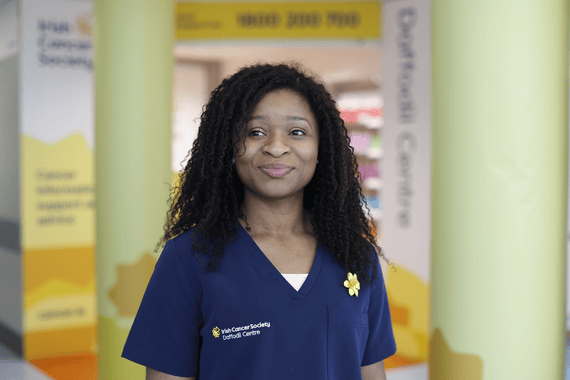Anal cancer
Diagnosis and tests
Diagnosing anal cancer
Your family doctor (GP) will talk to you about your symptoms and do a rectal examination. This is where your doctor puts a gloved finger into your back passage to feel for any lumps or swelling. This quick test may be slightly uncomfortable but does not hurt.
Your GP will refer you to hospital if they think you need more tests. Tests you might have include:
In this test your doctor looks inside your back passage with a hollow metal tube called a proctoscope.
A longer tube with a camera is used in this test. The tube is carefully put into your back passage and your doctor checks for any abnormal areas in the lower part of your bowel. He or she can also take samples of the cells in your bowel. This is called a biopsy.
A small sample of tissue removed from your anus during a proctoscopy or sigmoidoscopy and sent to the laboratory where it’s examined under a microscope.
If you are diagnosed with cancer you will need other tests to stage the cancer.
A gastroenterologist is a doctor who specialises in treating problems with the digestive system.

If you are diagnosed with anal cancer we're here for you.
Our cancer nurses are here if you need information or just want to talk. They can help you to understand your diagnosis, what to expect, send you information and tell you about our services.
Further tests for anal cancer
You may need further tests to give your doctors more information about your general health and about the cancer. For example:
To check your general health.
A special type of X-ray to give a picture of the tissues inside your body.
Read more about CT scan
A scan that uses magnetic energy to build up a picture of the tissues inside your body.
Read more about MRI scan
A device called a probe is passed into your back passage (rectum). It uses sound waves to give a picture of the tissues there. It can show any abnormal changes.
Read more about Ultrasound scan
A radioactive injection that will show up any cancer spread to other parts of your body on a CT scan picture.
Read more about PET scan
The tests you have can help to:
- Stage your cancer. This means finding out the size and position of the cancer.
- Grade your cancer. Grading describes how quickly the cancer may grow and spread and how it might respond to treatment.
Some tests may be used see how you are responding to treatment.
Waiting for test results
While some results may come back quickly, others may take a few weeks. Waiting for results can be an anxious time. It may help to talk things over with your doctor or nurse or with a relative or close friend. You can also call our Support Line on 1800 200 700 or visit a Daffodil Centre to speak to a cancer nurse.
What are the stages of anal cancer?
The stage of cancer describes where the cancer is and how big it is.
You will probably have a CT, MRI and PET scan to stage your cancer.
TNM staging system
The TNM system is used to stage anal cancer. This stands for:
- Tumour: The size of the tumour measured in centimetres and if it
has grown into nearby tissues. - Node: Whether any lymph nodes have cancer.
- Metastasis: Whether the cancer has metastasised (spread) to other areas in the body.
Your doctor often uses this information to give your cancer a number stage – from 1 to 4. In general, the lower the number, the less the cancer has spread.
Number staging
The cancer only affects your anal area and is smaller than 2cm.
The cancer only affects your anal area but is bigger than 2cm.
The cancer has spread to nearby lymph nodes.
The cancer has spread to other parts of your body, for example, your liver. This can also be called advanced or metastatic cancer.
Knowing the stage of your cancer helps your doctor to plan the best treatment for you.
What are the grades of anal cancer?
The grade of the cancer can help the doctor to predict how quickly the cancer will grow. You can have a low, moderate or high grade cancer. Lower grades are slower growing. Different grades may need different treatments.
Staging and grading can be hard to understand, so ask your doctor and nurse for more information if you need it.
Continue reading about anal cancer




Get help & support

Support Line
Free support pack

